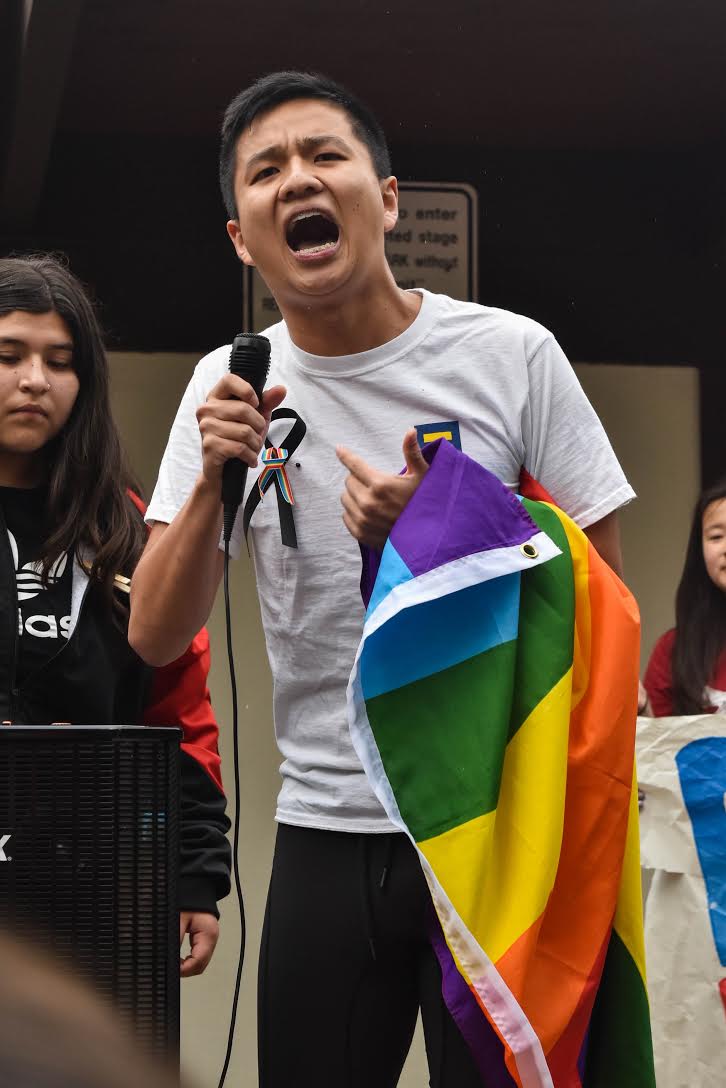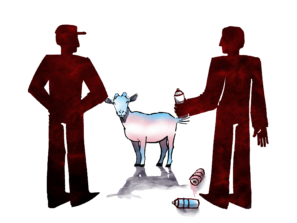
On the Thursday following the election of Donald Trump, I remember receiving a message from Nicole Jimenez. I remembered Nicole as a friend whom I sat next to in history class last year.
To be honest, I was surprised that I still had her name saved. I hadn’t talked to her for some while, so I wasn’t sure what to expect.
It seemed as though Nicole wanted to let me in on a walkout protesting Donald Trump. Still angry over the results of the election, I wholeheartedly supported the idea of taking class time outside of school to vent my frustration.
Nicole also invited Aragon’s Black Student Union and Latino Club, indicating that this rally would also be a focused, intersectional effort.
I spent the following weekend in a limbo. I had schoolwork to finish, and I was worried about what would happen with the protest. I wasn’t sure of the date, and it seemed to me as if a lot of other students were also wondering what the focus of this protest was — many voiced their disagreement on Facebook over the protest if indeed it held an anti-Trump sentiment.
After some tension, the protest was finally set on Tuesday. I immediately set my heart on going. I was proud to be a part of GSA and represent the LGBTQ+ community at the protest, and I couldn’t wait to be a part of the movement.
The day of the protest, we walked down Aragon boulevard. The whole experience was surreal; police motorcycles passed by us, but none of the protesters seemed to care. A couple homeowners stepped out to take pictures of us. A few passing drivers rolled down their windows, voiced their opposition to our movement, and asked us to return to school peacefully. But I knew that what we were doing was already peaceful. In fact, Nicole had urged us, when we gathered on the Alameda, to understand that our protest was not going to be a anti-Trump — rather, it was going to be a protest about love and acceptance and solidarity. I believe most of us took this to heart, because a majority of the signs and decorations that the protesters brought out urged onlookers to respect the rights of colored, LGBTQ+, and female citizens.
It was relatively empty in Central Park. We were the first ones there, and about 300 of us lined up against the stage next to the Japanese garden. A banner reading “United we will not be divided” unfurled before the crowd, and Nicole began to speak.
As students from San Mateo and Hillsdale High began to trickle in, the atmosphere intensified. There were posters, face paint, and pride flags displayed throughout the crowd, and many students came up to the stage to speak.
My own opportunity to speak came up when Justin invited me to express my thoughts on behalf of Aragon’s Gender and Sexuality Awareness club.
I invited everyone to recognize the exigency of intersectionality between minority groups. The current political situation was evident to me; our president-elect didn’t attack one group — he attacked all groups. And so I wanted everyone to understand how important it was to uplift each others.
When one group falls, everyone falls.
That’s the message I hoped would carry through the crowd. Even as the students from San Mateo and Hillsdale high trickled in, countless speeches reiterated how important it was to fight as a community, and not as an organization. I remember being brought to tears after seeing two flags — a Mexican flag and a Gender and Sexuality Awareness flag — tied together as one larger flag.
So here’s my reflection: there will be those who ask us to go home. Perhaps, we should not have sacrificed the hard work of our teachers for our own motivations. Perhaps our protest was a selfish movement. For the most part, we live in the Bay Area, where we are already sheltered by a rather progressive sphere of cultural and political elitism and wealth.
However, even in the political climate of the Bay Area, our emotional safety is not guaranteed.
It’s really not up to the Latino population, to the transgender community, or to women to fight the battle against oppression. When one group loses their right to their body, we all suffer. When one group gains the right to marriage and liberty, all minority groups benefit from that step forward.
I understand that this is a controversial statement, as it implies that we should allow certain groups to appropriate the pains, difficulties, and successes of others. However, I believe there is something much more to be said when we fight as a group, and not as a consortium of loosely connected minority groups. Pain is not appropriated; pain is suffered. Difficulties are not met individually; they are met communally. Success is not felt by one; it is felt by all. Humanity will not succeed when one gender, racial, ethnic, or socioeconomic group succeeds. There is a fine line to walk when we discuss intersectionality, but I have no doubt that the protest on Tuesday addressed this fine line in a deeper context.
I saw it firsthand with the flag, with the sign that said “I SUPPORT MY UNCLE AND HIS HUSBAND” and with the students from D-tech who took on three hours of detention to fight for their rights. I felt it with the resounding rhetoric of hope throughout the protest.
I know this protest had a profound meaning. I felt it in my heart, as I stood in front of a crowd of 1000.
In my mind, this protest acted as an invitation for further discussion. It opened up possibilities for exploring the possibilities of promoting intersectionality, even on campus.
There’s a whole world of hate coming our way, and there’s no time to relax. Before we tackle the system, we got to build our own system up. It’s game time, guys, and we better be ready to fight.





